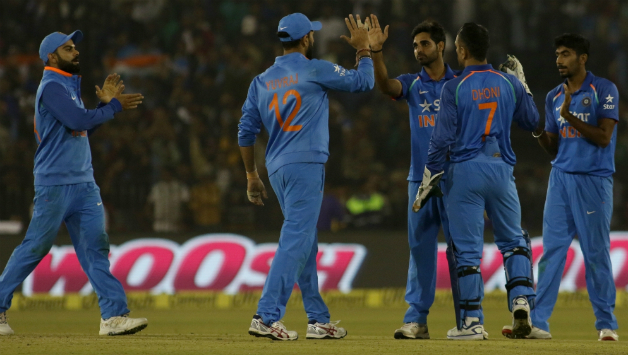
Cricket Country Staff
Editorial team of CricketCountry.
Written by Cricket Country Staff
Published: May 02, 2017, 12:54 PM (IST)
Edited: May 02, 2017, 01:30 PM (IST)


England moved up to the second spot while Pakistan moved ahead of India, who slipped to the fourth in the ICC Rankings for Teams in T20 Internationals, the global governing body informed in a release on Tuesday. India have lost six points to drop to the fourth spot in the table, whereas New Zealand remained at the top spot. Pakistan have a three-point lead over India in the ICC Rankings, and thus are at the third spot. Interestingly, India had lost to West Indies — placed at a lowly seventh spot — in the semi-final of the last ICC T20 tournament in which Pakistan had not even made it to the next round.
The ICC informed in a release, “England has vaulted into second place on the ICC T20I Team Rankings following the annual update*, which was carried out on 1 May to ensure the table continues to reflect the recent form of sides. England has benefitted significantly as it has risen three places after gaining seven points to now sit on 121 points. Eoin Morgan’s side is four points behind table-topper New Zealand, which is on 125 points after dropping two points.”
“India, the ICC World Twenty20 2007 champion, has also lost ground following the annual update after dropping six points to slip to fourth position. It is now on 118 points, three points behind ICC World Twenty20 2009 winner Pakistan, which has joined England on 121 points after gaining five points but is ranked behind the ICC World Twenty20 2010 winner by a fraction of a point,” the release added.
The next ICC event would be the ICC World T20 2020 to be played in Australia. As of December 31, 2018, top nine teams along with Australia will qualify directly for the tournament.
India had beaten England 2-1 in their last bilateral T20I affair, but it was not enough to help them climb ICC Rankings. The release said, “India has lost ground following the annual update after dropping six points to slip to fourth position. India has lost ground following the annual update after dropping six points to slip to fourth position. South Africa has slipped two places to fifth ranking after conceding six points, but is one point ahead of Australia.”
“Australia has swapped places with reigning ICC World Twenty20 champions, the West Indies, which is 14 points ahead of 2014 winner and eighth-ranked Sri Lanka (95 points, down by four). Bangladesh is ranked 10th on 78 points after gaining four points, while Zimbabwe has retained its 12th rank after gaining three points,” the release added.
In regard to the non-Test playing countries, the ICC said, “Among the Non-Test playing sides, Afghanistan and the Netherlands have moved in opposite directions. Afghanistan is the side to benefit most after England as it has gained six points and climbed to 90 points. But while Afghanistan has strengthened its ninth position, the Netherlands has dropped nine points to slip one place to 14th rank.”
| Rank | Change | Team | Points |
| 1 | (-) | New Zealand | 125 (-2) |
| 2 | (+3) | England | 121 (+7) |
| 3 | (+1) | Pakistan | 121 (+5) |
| 4 | (-2) | India | 118 (-6) |
| 5 | (-2) | South Africa | 111 (-6) |
| 6 | (+1) | Australia | 110 (-) |
| 7 | (-1) | West Indies | 109 (-3) |
| 8 | (-) | Sri Lanka | 95 (-4) |
| 9 | (-) | Afghanistan | 90 (+6) |
| 10 | (-) | Bangladesh | 78 (+4) |
| 11 | (-) | Scotland | 67 (+4) |
| 12 | (-) | Zimbabwe | 65 (+3) |
| 13 | (+1) | UAE | 52 (+4) |
| 14 | (-1) | Netherlands | 49 (-9) |
| 15 | (+1) | Hong Kong | 46 (+3) |
| 16 | (-1) | PNG | 39 (-4) |
| 17 | (+1) | Oman | 38 (-1) |
| 18 | (-1) | Ireland | 36 (-4) |
*All results from 1 May 2013 to 30 April 2014 have been dropped from calculations, while matches played from 1 May 2014 to 30 April 2016 are weighted at 50 per cent and matches played from 1 May 2016 are weighted at 100 per cent, the ICC release said.
This website uses cookies so that we can provide you with the best user experience possible. Cookie information is stored in your browser and performs functions such as recognising you when you return to our website and helping our team to understand which sections of the website you find most interesting and useful.
Strictly Necessary Cookie should be enabled at all times so that we can save your preferences for cookie settings.
If you disable this cookie, we will not be able to save your preferences. This means that every time you visit this website you will need to enable or disable cookies again.
